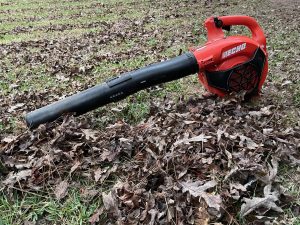The growing trend
 Across the US, over 11 million leaf blowers kick into action every year, blasting the natural autumn leaf cover far and wide – something that may soon come to an end. The general upkeep of the lawn has long persisted and become somewhat synonymous with the American dream – but the rolling, well-manicured greenway through the suburbs might be sacrificing both environmental well-being and our own health. In fact, bans on leaf blowers have already been enacted in Washington D.C., Miami Beach, and Evanston, Illinois, with west coast cities like Portland and Seattle to soon follow suit.
Across the US, over 11 million leaf blowers kick into action every year, blasting the natural autumn leaf cover far and wide – something that may soon come to an end. The general upkeep of the lawn has long persisted and become somewhat synonymous with the American dream – but the rolling, well-manicured greenway through the suburbs might be sacrificing both environmental well-being and our own health. In fact, bans on leaf blowers have already been enacted in Washington D.C., Miami Beach, and Evanston, Illinois, with west coast cities like Portland and Seattle to soon follow suit.
These decisions are underpinned by a study on the noise and air pollution directly attributed to gas-powered leaf blowers, accounting for some 17% of volatile organic compounds and 12% of nitrous oxides, both primary pollutants found in smog. Another report says these machines also spew out particulate matter, known as PM2.5 that has been linked to lung cancers, heart disease, and dementia among other things. Not to mention the noise itself can also cause health problems, with most lawn equipment easily topping the 55-decibel limit for the human ear. Harvard found that every 5-decibel increase in the average 24-hour noise level was associated with a 34% increase in heart attacks, strokes, and other serious heart-related problems. Such negatives have caused over 200 local governments to voice concern and pass legislation to ban gas-powered lawn equipment. But how did this go unnoticed for so long?
The simple answer is that as other machines like cars have steadily gotten cleaner with legislation and technological improvements, lawn equipment has largely stayed the same. Many leaf blowers still use an inefficient two-stroke engine that outputs up to a third of the fuel it mixes as unburned aerosol, contributing to the smoke and particulate matter mentioned above. So much so, that the state of California has estimated that off-road engines like the leaf blower puff out more smoke than all the 14 million passenger cars in the state, urging many to look to other sources to power their equipment.
Electric lawn equipment seems to be the solution many states are opting for, but it hasn’t been as easy to implement. Lawn services and avid gardeners have often been in protest of this legislation, with their business model centered around the quick refueling of gas-powered machines to optimize the houses on each route. Such sentiments have even culminated in organized protests, including a 1998 hunger strike in front of Los Angeles City Hall in response to leaf-blower bans. Some states have even adopted this stance, with Georgia Governor Brian Kemp signing a law to prohibit local governments from regulating gas-powered leaf blowers differently than electric-powered ones, adding another side to the developing issue.
LMA Newsletter of 11-20-23

